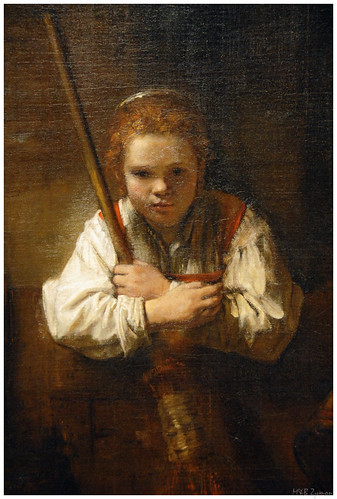As he so often does, Psychochild has written a post that has started my wheels spinning. He looks at a few essays about videogames and MMOs and concludes that those essays say as much about the essayist as they do about the game.
What is really interesting is that this tends to hold a mirror up to the person looking at the game, whether they realize it or not. One's actions and perceptions in the game tend to reflect as much if not more about the person as they do about the game or even the game's creators.
Once a work of art (and I'm
on record as thinking that videogames qualify as art, along with overpasses) is given to the public, the creator loses some ownership. It is not to be expected that every person will give some work of art the same meaning. This is just part of the process. Furthermore, art for which there can be only one meaning tends to be banal and trite. It feels forced and is kind of boring.

We all go looking for things that reinforce our world views and our choices. We look for symbols. We see things as symbols, and as children we draw them as symbols, as stick figures. One of the critical exercises when learning to draw is to stop looking at objects as symbols and start looking at patterns of light and dark instead. This is how one goes from drawing stick figures to painting "Girl With Broom".
So it is, I think with observations of the world. The ability to turn off those "meaning filters" is extraordinarily valuable, and somewhat rare. It can most certainly be learned.
I have little else to say about political interpretations of MMO's other than they are usually very, very superficial.
But what about gender presentation? I've
written on this topic before. The posts the Psychochild cites are interesting. I'd like to highlight a few of the issues that I see with portraying females in MMOs.
The first is, human beings as we find them, primarily in the United States, prefer clearly disambiguated genders. This isn't destiny, there are many who navigate the world with a more ambiguously gendered stance, sometimes from necessity, and sometimes from artistic choice. Marilyn Manson, Boy George, David Bowie and Eddie Izzard leap to mind.
But speaking for myself, encountering an ambiguously gendered person creates some anxiety. I've had my gender mistaken over the phone. Unlike the reaction of someone who is trans, I was not happy about that, nor was the person I was talking to, when I informed them. These are mistakes we don't like to make.
In the course of my long-time tabletop RPG, I have collected and painted miniatures. Many of them were female. Portraying the gender of a pewter (they have no lead any more) figurine that is about 1.25 inches high is a big challenge for a sculptor.
Person to person there are many, many gender cues. Along with the differences in body shape, there are some facial tendencies, differences in skin, in voice, in hair, in gait, and in posture. We call a man effeminate for holding his wrists a certain way. The cues in the Rembrandt painting above are subtle but unambigious, it is a girl that is being portrayed, not a boy.
But in a 1.25 inch high miniature, we lose most of this gender coding. There's no voice, the skin texture or quality is lost, the figure is static, and hence has no gait. Faces are too small to really portray the subtle facial differences. Posture can do it, anatomy (re: larger breasts and hips) can do it, and sometimes hair can do it. Of course, if it's an armored figure, in a fighting pose, that eliminates posture and hair. So we are left with breasts and to a lesser extent, hips to portray gender.
So it's likely that they will be exaggerated. One can portray gender with dress and hairstyle, and on these figures, the body shapes tend, in fact, to be less exaggerated.
The problems with miniatures are not as severe when translated into 3D art in an MMO, but they still exist. Looking at pixels on your screen is still not the same as the real thing. MMO characters don't often talk. Differences in skin texture are difficult. They have their name banner, which can be helpful, but they might have fantasy names, not so helpful. You can portray gender by placing an NPC in a traditional gender role. But that ends up seeming pretty sexist. But the culture they live in might be one with highly rigid gender roles.
So there are still some problems. But we are talking about NPC's and I think the options available to artists and character designers are pretty good. As well as the options available to players for dress and hairstyles. Gone are the days of EQ1 where wood elf females were pretty much stuck with wearing a leotard or plate armor.
But what about mobs, the generic NPC's that you are meant to kill. Have you ever
seen a gnoll? I mean, a
female gnoll? I don't think I have. There are thousands upon thousands of gnolls in Antonica, Blackburrow and elsewhere. And every single one of them, with the possible exception of a few named, are male. I'm not sure I've ever seen a female orc in EQ2 either. Either that, or it was completely forgettable.
Why is this? Well, gnolls are sentient dogs. We all know how to tell a male dog from a female. But would that be acceptable on a figure that stands up right and talks along with barking? Would any parent let their child play that game?
However, SOE could put clothing on the gnolls, or maybe they already have. But let's press a little further. In our culture, we are equipped with some taboos about women and violence, and I think they are in play in MMO's.
First, there is a taboo against violence toward women and children. I can think of a few places where there are young versions of creatures that one is supposed to kill, but they aren't humanoid. Young drakelings, young wolves, that sort of thing. There aren't many quests where you are supposed to go kill the young hobbits.
There is more violence against females however. Many of the vampires in Mistmoore Castle are female. Many of the great dragons of Norrath are female. There are sirens. The sirens say things when you fight them that rub salt in the wound, as I recall, attempting to shame you for fighting them. Nasty, but they ARE trying to kill me, after all.
There's a corollary taboo that sometimes unfolds: that women do not, or can not, engage in violence.
I do martial arts. I've seen both of the above taboos play out in the dojo. I've seen men who were unwilling to use proper techniques or proper intent when their current partner was a woman. Ultimately, this deprives the woman of critical training, and ends up being a lack of respect. One of the first things most women must overcome when they come in the door is the idea that they are not capable of violence. (I consider that idea dangerous, by the way. I think it's better to know what's in the shadows than to ignore it).
I've seen this play out in MMO's as well. I've watched many women come into the game choosing first to be a healer. Then, it seems, they discover the joy of doing DPS. This arc ends with them becoming tanks.
In order to tank, anyone, woman or man, must be comfortable with being the center of attention, the initiator of action, and with the idea that they are going to have a bunch of NPC's trying to kill them constantly, and that this is something to be desired and fun. There are things in male culture (outside of gaming) that support this better than female culture, I think. But that's not hard-wired, it's clear that anyone with a will can learn it.
Getting back to the subject of gnolls, I have to wonder if there is a lack of female gnolls precisely because game designers (or players) were uncomfortable with the idea of making war on the women (and by extension, the children). Gnolls are mostly cardboard cutout, the sentient version of the fire beetles. They are there to be a punching bag.
Would you put a woman's face on a punching bag?
Labels: Everquest 2, sexism



